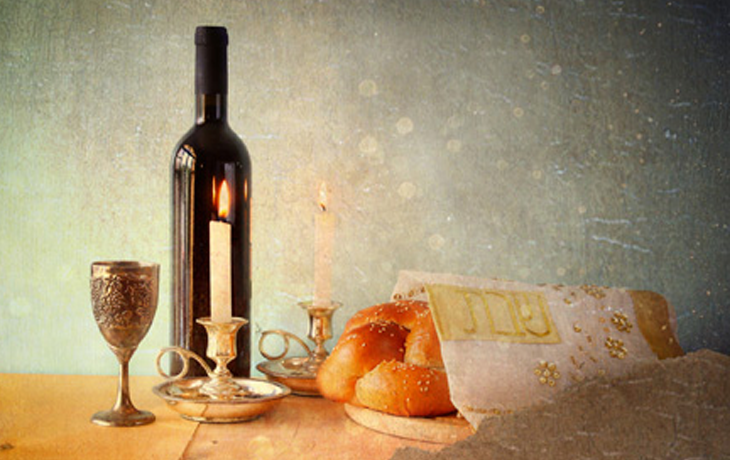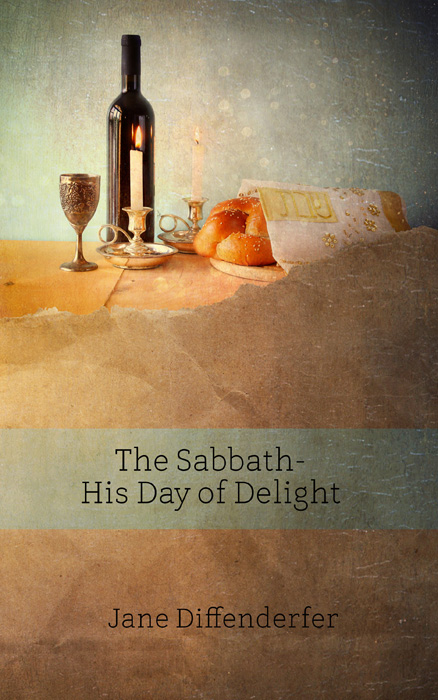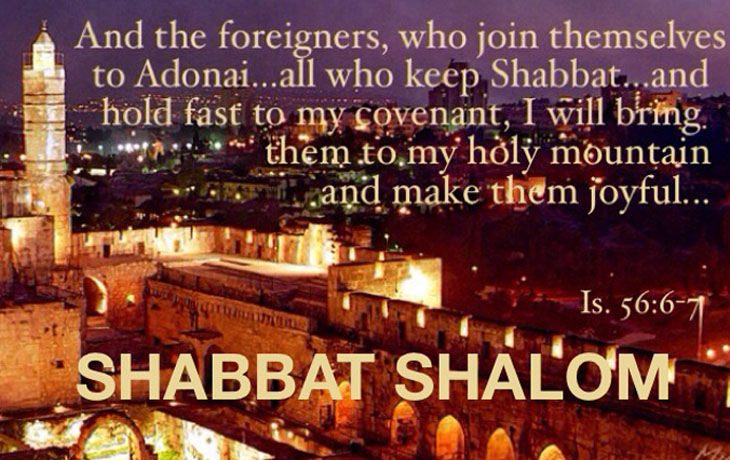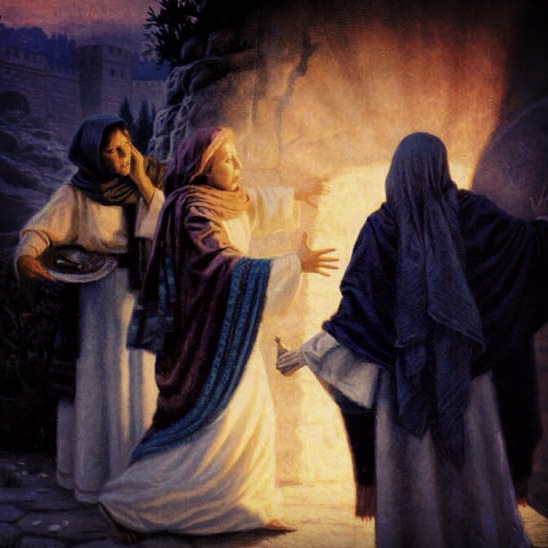The Women that Followed Messiah from Galilee
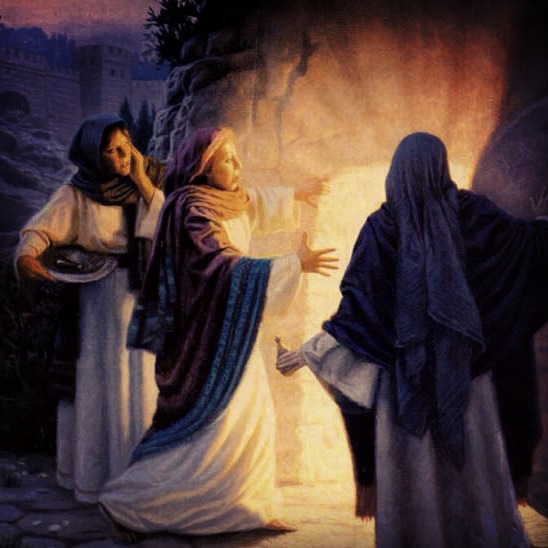
In the beginning of Messiah Yeshua’s ministry, along with the Twelve Apostles, there was a group of women that followed Him from Galilee. We read about them in the gospels, but perhaps we have not paid attention to them before.
And it came about soon afterwards, that He [Yeshua/Jesus] began going about…proclaiming and preaching the Kingdom of God; and the twelve were with Him, and also some women…Mary who was called Magdalene…Joanna the wife of Chuza, Herod’s steward, and Susanna, and many others who were contributing to their support out of their private means. (Luke 8:1-3)
These women were the first-hand witnesses of the Gospel of Messiah. They saw His crucifixion on the Day of Passover, they observed where He was buried for three days and nights during Unleavened Bread, and they confirmed His resurrection on the day after the weekly Sabbath on the Biblical holiday of Firstfruits. The Scriptures confirm this beginning with Matt. 27.
Now the centurion…saw the earthquake and the things that were happening, became very frightened, and said, ‘Truly this was the Son of God!’ And many women were there looking on from a distance, who had followed Yeshua [Jesus] from Galilee…among whom was Mary Magdalene, along with Mary the mother of James and Joseph, and the mother of the sons of Zebedee. (Matt. 27:54-56)
After Yeshua’s death, these female disciples watched and remained with the body of Messiah, as they waited for His burial. They were attentive to ministering to the needs of Yeshua’s body.
And when it was evening, there came a rich man from Arimathea, named Joseph, who himself had also become a disciple of Yeshua. This man went to Pilate and asked for the body…And Joseph took the body and wrapped it in a clean linen cloth, and laid it in his own new tomb…and he rolled a large stone against the entrance of the tomb and went away. And Mary Magdalene was there, and the other Mary, sitting opposite the grave. (Matt. 27:57-61)
…the day was the preparation, and the Sabbath [annual Sabbath of Unleavened Bread] drew on. And the women also, which came with Him from Galilee, followed after, and beheld the sepulcher, and how His body was laid. They returned, prepared spices and ointments, and rested the Sabbath day [the first day of Unleavened Bread] according to the commandment. (Luke 23:54-56)
And when the Sabbath was past, Mary Magdalene, and Mary the mother of James, and Salome, had bought sweet spices, that they might come and anoint him. (Mark 16:1)
The book of John (20:1) states that, “it was yet dark” when Mary Magdalene came to the tomb . The Greek text indicates the hour was between 3:00-6:00 am. The book of Matthew states, “In the end of the Sabbath, as it began to dawn toward the first day of the week, came Mary Magdalene and the other Mary to see the sepulcher.” (Matt. 28:1) In Hebraic reckoning the new day begins, just as the sun sets on the previous day. Therefore, during the dark hours, of the first day of the week, on the Biblical holiday of Firstfruits, Messiah was raised from the dead.
And, behold, there was a great earthquake: for the angel of the Lord descended from heaven, and came and rolled back the stone from the door, and sat upon it. His countenance was like lightning, and his raiment white as snow: And for fear of him the keepers did shake, and became as dead men. And the angel answered and said unto the women, “Fear not: for I know that you seek Yeshua, which was crucified. He is not here: for He is risen, as He said…And go quickly, and tell His disciples that He is risen from the dead”…And they departed quickly from the sepulcher with fear and great joy; and did run to bring His disciples word. (Matt. 28:2-8)
When the women arrived at the tomb, they discovered that the stone had been rolled away. The resurrection of Messiah had already occurred before the first light of day. The only people present at the time were the soldiers keeping watch, and they did not witness the resurrection, because they had passed out in fear at the sight of the angelic visitation. When they recovered from their dread, they must have run from the scene in stark terror.
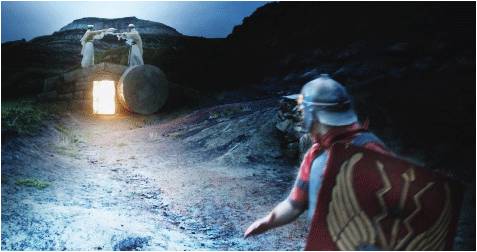
This is a good time to interject something. Today, some skeptics state that Christianity is ancient Mithraism revisited. To some degree they have a point, because modern Christianity has strayed away from the Biblical Jewish or Hebraic roots of the faith. There are traditions and customs, adopted in the fourth century, that many unknowing Christians still keep, that have their origins in Mithraism. The worship of Mithra was a mystery religion of Roman soldiers, sailors, and merchants; one that only men participated in. If one wanted to create evidence for the cult of Mithra in the resurrection story, men should have arrived at the tomb first. The detailed Biblical information of women being present to witnesses of the death, burial, resurrection, and ascension of Messiah, throws out the Mithraism speculation all together. As Christians and Jews are replacing the traditions of man in their lives, with the instructions of Scripture, we should also take another look at the believing women in the first century. What role should women play, as commanded by the angels and Yeshua, in the preaching of the Good News?
The word angel, in both Hebrew and Greek, means a messenger. The message given by the angels to the women was:
Why seek ye the living among the dead? He is not here, but is risen: remember how He spoke unto you when He was yet in Galilee, Saying, The Son of man must be delivered into the hands of sinful men, and be crucified, and the third day rise again. And they remembered His words, and returned from the sepulcher, and told all these things unto the eleven, and to all the rest. It was Mary Magdalene,and Joanna, and Mary the mother of James, and other women that were with them, which told these things unto the apostles. And their words seemed to them as idle tales, and they believed them not. Then arose Peter, and ran unto the sepulcher; and stooping down, he beheld the linen clothes laid by themselves, and departed, wondering in himself at that which was come to pass. (Luke 24:5-12)
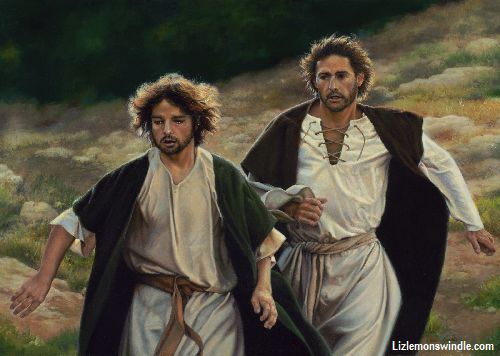
While Peter and John ran to the tomb, seeking evidence of the women’s words, they did not believe. They left the scene, and only one woman remained to try to understand what was happening.
For as yet they knew not the scripture, that He must rise again from the dead. Then the disciples went away again unto their own home. (John 20:9-10)
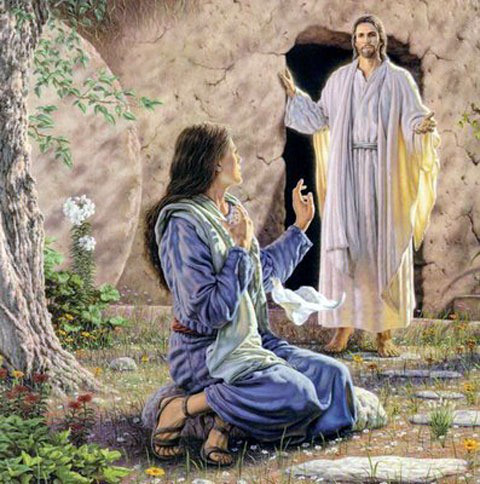
But Mary stood without at the sepulcher weeping…and looked into the sepulcher, and seeing two angels…And they said unto her, “Woman, why do you weep?” She said unto them, “Because they have taken away my Lord, and I know not where they have laid him.” And when she had thus said, she turned herself back, and saw Yeshua standing…(John 20:13)
Mary thought He was a gardener and it wasn’t until Yeshua called her by name, that she recognized Him and called Him Master.
Yeshua said unto her, “Touch me not; for I am not yet ascended to my Father: but go to my brethren, and say unto them, I ascend unto my Father, and your Father; and to my God, and your God.” Mary Magdalene came and told the disciples that she had seen the Lord, and that He had spoken these things unto her. (John 20:11-18)
Important to note here is something new is being revealed about the New Covenant in Messiah. Yeshua could have chosen to first reveal Himself after His resurrection to Peter and John. After the group of women revealed the good news of the empty tomb to the Apostles, both men ran to the tomb. The reason Yeshua did not first reveal Himself to the males is part of the restoration of all things. Yeshua deliberately waited until Mary Magdalene was alone to reveal the new order of life in the Kingdom. Messiah’s first word spoken after His resurrection was, “Woman”, to enlighten us all that the curses and its associated punishments of the first Adam was over. The Seed of the Woman has overcome through the blood of Messiah Yeshua! “Woman” it is now time for you to become a preacher of the Good News! The shocking revelation that a woman was the first to experience the New Covenant shocked the Apostles so much that they could not fathom it.
And they, when they had heard that He was alive, and had been seen of her, believed not. After that He appeared in another form unto two of them, as they walked, and went into the country. And they went and told it unto the residue: neither believed they them. Afterward He appeared unto the eleven as they sat at meat, and upbraided them with their unbelief and hardness of heart, because they believed not them, which had seen Him, after He was risen. And He said unto them, Go ye into all the world, and preach the gospel to every creature. (Mark 16:10-15)
Messiah rebuked the Eleven Apostles for unbelief and a hard heart because they would not receive the Good News delivered to them, by the female image bearers. They first thought the women were speaking nonsense, and did not believe in the revelation of the Word they shared. The angels gave the women a message to preach, a message to share with the Apostles, but they did not receive it. Messiah Yeshua, Himself, gave Mary Magdalene the additional instruction to enlighten the brethren with the glorious hope, that He ascended. She had witnessed the resurrected Messiah, still they did not believe. Then two men shared the Good News of their road to Emmaus experience. Still, they did not believe until they saw Yeshua with their own eyes.
At the end of the day of Firstfruits, Yeshua entered into the disciples’ presence with a rebuke, but also offered a word of encouragement.
Then the same day at evening, being the first day of the week, when the doors were shut where the disciples were assembled for fear of the Jews, came Yeshua and stood in the midst, and said unto them, Peace be unto you. And when He had so said, He showed unto them His hands and His side. Then were the disciples glad, when they saw the Lord. Then said Yeshua to them again, Peace be unto you: as my Father hath sent Me, even so send I you. And when He had said this, He breathed on them, and said unto them, Receive ye the Holy Ghost. (John 20:19-22)
The women, who traveled with Messiah from the beginning of His ministry in Galilee, were included in these disciples of Yeshua. One reason we can deduce this, is they knew where the hiding place was. Mary Magdalene traveled there at least two different times on the day of Firstfruits; first with a message from the angels and then again later following Yeshua’s instructions. Interesting to note, the women were not hiding in fear, like their male counterparts. Instead, they were seeking the LORD, by drawing near to the body of Messiah. Their seeking lead to them being used as apostles to the Apostles.
The book of Acts gives us more details, about the women, who followed Yeshua from Galilee.
Until the day in which He was taken up, after that He through the Holy Ghost had given commandments unto the apostles whom He had chosen: To whom also He showed himself alive after His passion by many infallible proofs, being seen of them [men and women] forty days, and speaking of the things pertaining to the kingdom of God: And, being assembled together with them, commanded them that they should not depart from Jerusalem, but wait for the promise of the Father, which, saith He, ye have heard of me. (Acts 1:2-4)
And when He had spoken these things, while they beheld, He was taken up; and a cloud received him out of their sight. And while they looked steadfastly toward heaven as He went up, behold, two men stood by them, in white apparel; Which also said, Ye men [people] of Galilee, why stand ye gazing up into heaven? This same Yeshua, which is taken up from you into heaven, shall so come, in like manner, as ye have seen Him go into heaven. Then returned they unto Jerusalem from the mount called Olivet, which is from Jerusalem a Sabbath day’s journey. And when they were come in, they went up into an upper room, where abode both Peter, and James, and John, and Andrew, Philip, and Thomas, Bartholomew, and Matthew, James the son of Alphaeus, and Simon Zelotes, and Judas the brother of James. These all continued with one accord in prayer and supplication, with the women… ( Acts 1:9-14)
The women, who followed Messiah from Galilee, were given the authority to preach, inform, and share the revelation of the Gospel, even to the male Apostles, by both angels and Messiah Himself. Perhaps we should reconsider the verse, “For this cause ought the woman to have power [authority] on her head because of the angels” (1 Cor. 11;10). Since Messiah Yeshua, along with the angels, confirmed the intent of the prophet Joel (vs. 2:28 and Acts 2:17-21) at His Firstfruits resurrection, we should also give the liberty and authority to His Spirit-led women to preach and teach, in both our congregations and our communities of faith.
May we all soften our hearts to the kindness of our Savior toward His women, and be of one accord, until He returns.
